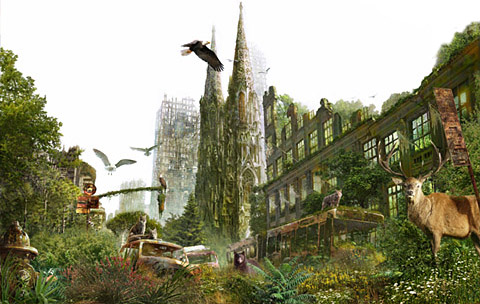The World Without Us
Alan Weisman, 2007
This book expands on an article in Discover magazine about what would
happen if humans suddenly vanished but left the rest of the world exactly as is.
The basic idea is that while you may think that our homes and cities would quietly
collect dust for thousands of years in our absence, in fact it would only be a
matter of a few years before houses collapsed, trees burst through roads, and
almost all traces of human civilization disappeared. It takes constant human
activity to keep nature at bay. This is a very interesting thing to have pointed
out, and I bet it made for a dynamite Discover magazine article. The
problem is that the book is essentially the Discover article plus two
hundred extra pages of vamping, as The World Without Us meanders from topic
to tangential topic: Wouldn't nuclear plants melt down? Doesn't plastic last a long
time? Hey, what might wipe us out in the first place? Some of these bits are
interesting — I was particularly interested in the chapter about Varosha,
a tourist resort in Cyprus that has been abandoned since the Turks captured it in
1974 — but it still feels bloated. As the book wears on and the chapters get
shorter and shorter, as if the author were telling his editor, "What? I have to pad
it out by another ten pages? All right, but this is the last time!"
It isn't just the structure that keeps The World Without Us from feeling
like a real book. I plunged into it knowing nothing about the author, assuming
he was a scientist or an urban studies professor or something like that. But I soon
noticed something strange. Weisman not only keeps turning over the floor to various
experts in the field, but he describes them, as if it were somehow important
what these people look like. "Gülyaz, a proud native with a moustache thick
as a fine Turkish rug..." "Fred Newhouse, a compact, congenial man with light brown
skin and grizzled hair..." What's up with that? I turned to the back flap and
read the author blurb, which described him as "an award-winning journalist."
And it occurred to me — maybe this book is written the way it is because the
author wished it were a special on one of those newsmagazine shows or something.
As we sit on the train reading this book, in our mind's eye we're not supposed to
imagine what the talking heads are saying — we're supposed to imagine them
saying it, sitting in their offices with a window full of representative scenery
behind them. But as Weisman points out, TV transmissions will be propagating
through the universe long after every book ever printed has become food for
microbes, so it's easy to understand why he might have aspired to the more
permanent medium.

Return to the Calendar page!
|




